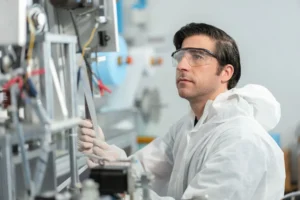Skilled Mexican Engineers Could Help Fill Labor Gaps
Like so many other industries in the days and months following the global pandemic, a reinvention of sorts is underway in the automotive engineering industry. Electronification is taking place at car manufacturers around the globe to produce more electronic vehicles, increase connectivity and technology innovation, and ultimately, work to beat the competition.
With efforts to reduce emissions occurring around the world, the automotive industry is working to do its part. In the U.S., nearly every major automaker has a plan in place to begin production of electric vehicles; that is if they haven’t started already. In 2021, nearly 6.4 million electric vehicles were sold — an increase of over 100% from the prior year.
What this means for U.S. automotive workers is that the skills required to fulfill positions within the industry are also changing.
How Electronification Has Changed the Focus of the Automotive Industry
According to the Deloitte 2022 Global Automotive Consumer Study, 26% of U.S. respondents said they intend to purchase an electric vehicle in the next three years. Demand for these types of vehicles is growing across the country, as car manufacturers work to budget the expense associated with the electronification of their products and production facilities.
The industry is working against a number of challenges: updating its model requirements, a shifting regulatory environment, and new technology requirements. On top of that, there are financial pressures being applied due to rising inflation and a lack of skilled workers in the job market to fulfill current production needs.
But the real challenge automakers face is looking ahead and planning how they will be on the cutting edge of innovation with so many others also focusing on research and development in this area. Electric vehicles are in their infancy, and full adoption by consumers will take time and evidence that vehicles are safe, batteries can power them where they need to go, and that innovation continues to improve the experience.
Building a Bench of Automotive Engineers
In order to be on the cutting edge, companies are going to need to build their bench of automotive engineering specialists, a growing area of expertise across the industry.
So, the question is whether automakers should focus on bringing in a new class of control engineers, robotics engineers, and software engineers, to work toward innovation and electronification projects, or should they be building training programs for their current workforce to learn new high-tech skills to fill the needed gaps?
In order to meet the growing demand for automotive engineering specialists who possess the knowledge of both traditional manufacturing along with more modern engineering skills, it will take a while for the industry to establish needed training programs and to build a pipeline of employees willing to take on additional learning and responsibility.
However, going back to the labor market in search of skilled workers has some leaders skeptical, as they have struggled since the pandemic to fill jobs. In fact, 77% of manufacturers believe they will continue to face difficulty attracting and retaining talent in the coming years.
Mexican Engineers Are Trained for This
The skilled workforce is booming in Mexico, with the necessary skills and education to assist the U.S. automotive industry. Mexico’s local and regional governments have invested in the development of training and education programs focused on building a skilled engineering workforce because of the abundance of automotive and electronics manufacturing that takes place in the country. In 2021, the Mexican automotive industry was the seventh-largest producer of autos worldwide.
The high level of education and skill has Mexico’s engineering workforce at a comparable level to that of U.S. workers. Most graduates of a university are bilingual and could transition to a U.S. workplace. Each year, more than 13,000 engineers graduate from Mexico’s universities, and the talent pool is considered one of the best worldwide.
If you are in the automotive industry and seeking skilled automotive engineering workers, including control engineers, robotics engineers, or software engineers, 3 Amigos Recruiting can assist you in recruiting from the Mexican labor market.
TN Visas Make Hiring Mexican Professionals Possible
The TN visa program, part of the North American Free Trade Agreement (NAFTA), allows qualified Canadian and Mexican citizens to enter the U.S. for professional business. To be eligible for the TN visa, the individual must have a full or part-time position with a U.S. employer and meet other designated criteria. Visa holders are able to bring their spouses and children with them to the U.S.
According to Statista, the U.S. Department of State has issued an average of nearly 700,000 TN visas each year. Automakers interested in growing skilled labor pools with Mexican engineers can take advantage of the TN visa program, as engineering is a qualified profession under the program.
The immigration experts at Wyngaard Law Firm are available to assist companies that would like to utilize the TN visa program to attract workers from a wider market. Please contact them or 3 Amigos Recruiting for more information about growing your auto workforce with engineers from Mexico.







